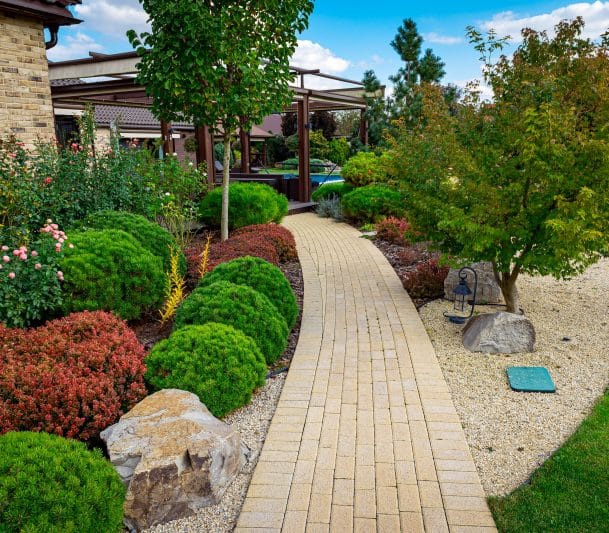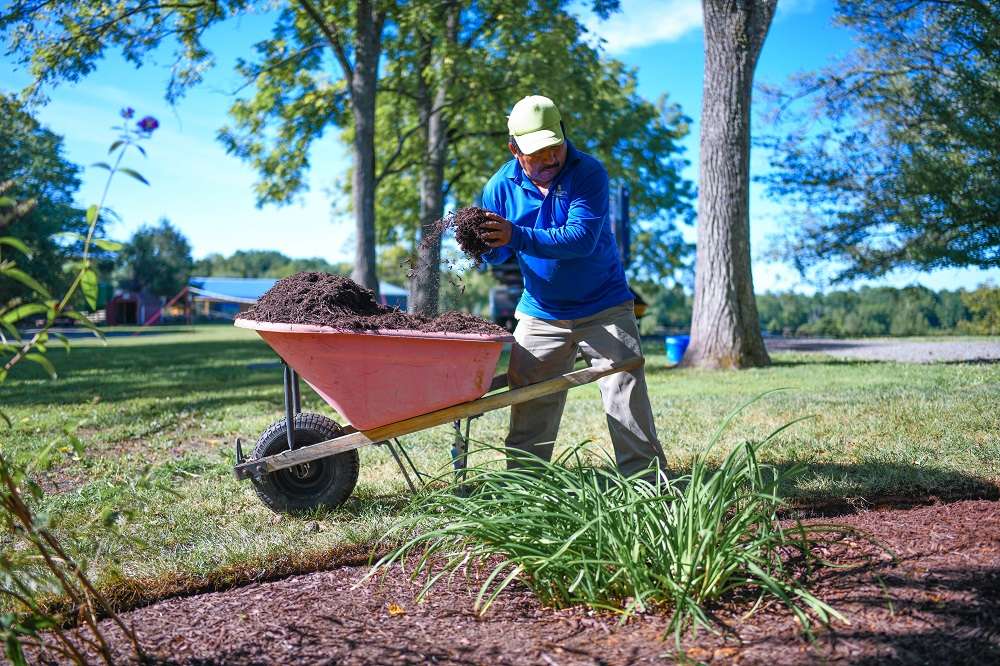Professional landscaping strategies for long-lasting outdoor beauty
Recognizing the Comprehensive Range of Functions in Expert Landscaping Services
The substantial scope of expert landscape design services includes a selection of basic aspects - landscaping services. It includes landscape layout concepts, plant option, and hardscaping attributes. Additionally, it resolves irrigation systems and maintenance approaches. Each element plays a critical duty in developing practical and aesthetically pleasing exterior spaces. Comprehending how these parts function together can reveal much concerning the art and science of landscaping. The trip right into this elaborate area is just starting.
Landscape Layout Concepts
Efficient landscape style concepts are important for producing harmonious exterior rooms that improve both aesthetic charm and functionality (Learn More). These principles assist the setup of components within the landscape, guaranteeing a natural visual experience. Secret parts consist of balance, which distributes visual weight equally; proportion, which connects the dimension of various components per other and the area; and unity, which creates a feeling of integrity via consistent themes and products

Plant Choice and Setup
In the domain of professional landscape design, plant option and installation play a critical function in accomplishing a flourishing garden. Emphasizing indigenous plant advantages, seasonal factors to consider, and the details dirt and sunlight requirements of each species assures a sustainable and aesthetically pleasing landscape. Careful preparation in these areas not only enhances biodiversity yet likewise promotes long-term ecological health.
Native Plant Benefits
Why should homeowners take into consideration native plants for their landscape design jobs? Indigenous plants supply many advantages that enhance both aesthetics and ecological sustainability. They are well-adapted to regional environments, needing less water and maintenance contrasted to non-native varieties. This resilience minimizes the requirement for chemical fertilizers and chemicals, promoting a much healthier ecological community. Additionally, indigenous plants give habitat and food for regional wildlife, including pollinators, which can boost biodiversity in domestic locations. Their knowledge with local soil and weather also brings about better growth rates and durability. By picking native plants, home owners not only develop visually attractive landscapes but additionally add to ecological conservation, making a positive impact on their neighborhood environment. Consequently, native plants represent a wise option for landscape design tasks.
Seasonal Plant Considerations
Homeowners that have accepted indigenous plants in their landscape design can even more improve their exterior spaces by considering seasonal plant selections. By incorporating plants that grow in particular seasons, they can create visually enticing and vibrant landscapes throughout the year. Springtime may usher in vibrant blooms like daffodils and tulips, while summer can display lush foliage and vivid perennials. Autumn introduces a palette of warm tones with asters and goldenrods, while winter season can be highlighted with evergreens and decorative turfs for texture. Professional landscaping companies typically recommend choosing plants that not just complement existing indigenous types yet likewise offer year-round interest and assistance regional wildlife. This thoughtful technique to seasonal plant choice ensures a consistently evolving and lasting garden setting.
Soil and Sunlight Needs
Successful landscaping rests on comprehending the specific dirt and sunlight requirements of plants. Different types flourish under differing problems, needing a careful evaluation of both factors throughout the selection procedure. Dirt types, such as sandy, clay, or fertile, impact water drainage, nutrient accessibility, and root growth. Furthermore, pH degrees can influence plant health and wellness, demanding soil testing to identify viability. Sunlight requirements differ significantly; some plants flourish in complete sun, while others like partial or complete shade. A professional landscaping company considers these aspects to guarantee peak growth and visual allure. By aligning plant choices with the setting's specific attributes, landscapes can achieve sustainability, durability, and aesthetic harmony, eventually causing effective plant establishment and long-lasting upkeep.
Hardscaping Features and Construction

While landscape design usually stimulates photos of lavish plant and vivid blossoms, hardscaping attributes play a vital duty in defining outside areas. These components, which consist of outdoor patios, sidewalks, preserving wall surfaces, and ornamental stonework, give structure and capability to lawns and yards. Hardscaping uses products such as concrete, brick, wood, and stone, enabling for diverse layouts that enhance the all-natural landscape.
The construction of hardscaping features calls for cautious planning and implementation to ensure resilience and aesthetic charm. Specialists examine site problems, water drainage, and spatial connections to create natural outside environments. Appropriate setup methods are important, as they protect against problems like erosion and moving over time.
Including hardscaping not just enhances the aesthetic interest of a property but likewise facilitates outside activities, making it a fundamental element of extensive landscape design services. Inevitably, thoughtful hardscaping adds to both the performance and elegance of outside spaces.
Irrigation Systems and Water Management
Effective irrigation systems and water administration are crucial elements of specialist landscaping, as they ensure that plants obtain the needed hydration for perfect development. These systems can differ from straightforward drip irrigation arrangements to innovative automated automatic sprinkler, developed to fulfill the details needs of diverse landscapes. Proper water administration not only optimizes water usage, lowering waste, yet also enhances plant health and wellness and lessens condition threats.
Landscape design professionals evaluate different aspects, consisting of soil type, plant types, and regional environment, to develop customized irrigation services. Furthermore, including rain harvesting strategies can further enhance sustainability and efficiency. Normal upkeep of watering systems is vital to preserve functionality and avoid leaks, which can result in water loss and enhanced expenses (Learn More). Ultimately, a well-designed watering system plays a crucial role in protecting the aesthetic allure of exterior areas while promoting eco-friendly stewardship within expert landscape design techniques
Lawn Care and Upkeep Strategies
Grass treatment and upkeep techniques are basic for accomplishing a rich, healthy yard that improves the total landscape. These methods encompass numerous methods targeted at advertising optimal growth and visual charm. Normal mowing is important, as it encourages thick, even development while stopping weeds from developing. Furthermore, appropriate fertilization offers necessary nutrients, with applications tailored to the specific lawn type and soil conditions.
Watering methods should focus on deep, infrequent irrigation to urge root advancement, while oygenation boosts soil framework and advertises nutrient absorption. Insect and condition management is likewise crucial; determining concerns early permits reliable treatments that decrease damage.
Overseeding can invigorate slim or damaged grass, boosting thickness and shade (landscaping). By executing these targeted yard treatment strategies, landscaping experts can ensure that yards stay lively and healthy and balanced throughout the seasons, considerably adding to the total elegance of the building
Seasonal Landscape Care and Maintenance
As the periods change, proper landscape treatment comes to be crucial for preserving the health and wellness and beauty of outdoor spaces. Each period presents unique difficulties and requirements. In spring, landscape specialists concentrate on trimming, planting, and feeding to motivate growth. Summertime demands regular watering, weed control, and insect administration to shield recently developed plants.

Throughout the year, seasonal landscape maintenance assurances that exterior locations stay healthy and aesthetically enticing. Expert services can give tailored upkeep strategies that adjust to the particular demands of each season, enabling residential or have a peek at this website commercial property proprietors to enjoy lively landscapes year-round. On the whole, seasonal treatment is an important aspect of specialist landscaping that promotes long life and visual value.

Lasting Landscaping Practices
An expanding number of home proprietors are embracing sustainable landscape design practices to produce eco pleasant outside rooms. These techniques concentrate on preserving sources, improving biodiversity, and lessening environmental effect. Indigenous plants are frequently chosen for their reduced water needs and compatibility with neighborhood ecosystems, decreasing the demand for chemical fertilizers and pesticides. Rainfall yards and permeable paving are used to manage stormwater runoff, promoting groundwater recharge and lowering erosion.
Moreover, sustainable landscape design includes organic gardening methods that prioritize soil health and advertise all-natural parasite control. Efficient watering systems, such as drip watering and rainwater harvesting, aid maximize water use. Additionally, landscape developers progressively advocate for making use of recycled products, such as reclaimed wood and stones, to decrease waste. By taking on these sustainable practices, residential or commercial property proprietors not just add to eco-friendly conservation but additionally produce aesthetically pleasing atmospheres that can love minimal upkeep.
Often Asked Inquiries
For how long Does a Landscape Design Project Typically Require To Total?
Typically, a landscape design task can take anywhere from a couple of days to numerous weeks to finish, depending upon the project's dimension, layout, and complexity needs. Factors such as climate and source schedule also influence timelines.
What Variables Influence the Expense of Landscape Design Services?
Various elements influence landscape design solution expenses, consisting of project size, style complexity, material quality, labor costs, geographical area, and seasonal need. Each aspect contributes distinctively to the general monetary requirements of a landscaping project.
Are Landscaping Services Available Year-Round?
Landscape design services are usually readily available year-round, although schedule might vary based on region, seasonal climate condition, and specific service offerings. Some services could be restricted during extreme weather condition or off-peak seasons.
Do Landscaping Firms Deal Guarantees on Their Job?
Many landscaping companies do supply service warranties on their work, which can vary in length and coverage. Customers are motivated to inquire concerning details terms, ensuring they understand what is assured and any type of conditions that use.
Can I Design My Landscape Without Professional Assist?
Yes, individuals can make their landscapes without expert aid. Nevertheless, they may lack experience in plant option, design, and ecological factors to consider, possibly bring about less efficient designs that could require pricey adjustments later.
In the domain name of professional landscape design, plant option and installation play an essential function in attaining a flourishing yard. Property owners that have actually accepted indigenous plants in their landscaping can further improve their exterior spaces by thinking about seasonal plant options. Effective landscaping hinges on recognizing the specific dirt and sunlight requirements of plants. Reliable irrigation systems and water management are crucial parts of professional landscaping, as they ensure that plants obtain the essential hydration for perfect development. Landscape design specialists assess various elements, consisting of soil type, plant types, and local climate, to create tailored irrigation remedies.